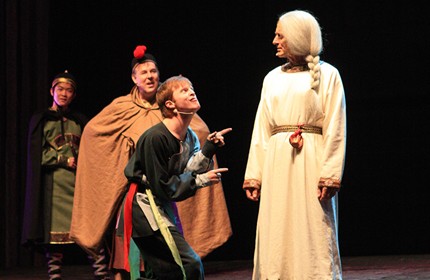News & Events | About PKU News | Contact | Site Search
Joseph Graves is a drama teacher, theater director, actor and playwright. He has spent the best part of the last 10 years at Beida, engaging in developing theater departments in Chinese universities where none exists.
Peking University, July 1, 2011: Although probably best known today for being the artistic director of Peking University’s (Beida) Institute of World Theatre and Film in Beijing, Joseph Graves is also something of a dramatist.
His latest bilingual play Man’s Best Friend, about the relationship between humans and animals, was performed at Beijing’s Fengshang Theatre earlier in June.

Graves and students from Beida and Syracuse University stage King Lear.
Many faces of theater
Graves’ multiple roles as a drama teacher, theater director, actor and playwright have seen him act in TV shows, including the 1980s classic Knight Rider and lead roles including King Lear, Othello, Hamlet and Macbeth.
But he has spent the best part of the last 10 years at Beida at the invitation of the university’s Foreign Languages School, engaging in developing theater departments in Chinese universities where none exists.
With the founding of the Beida Institute of World Theatre and Film in 2005, Graves has been able to produce more productions and promote cultural exchanges between the theatre communities in China and other part of the world.
He has also given lectures in about 70 universities throughout the country, brought over 100 dramatists from the UK and US to teach with him, and more than 30 of his students have chosen to study theater in graduate schools in the US and Europe. But does he still miss treading the boards?
“It is always more exciting to be on stage and be the star,” admitted Graves, who only acts now occasionally. “I like [teaching and acting] both… [It’s] a big reward to see the students become very good actors and good directors… Sometimes their acting is more moving to me than professional actors... Students always do it because they… have deep feelings for what’s going on.”
“What Joseph has been doing at Beida is quite meaningful…and he has been dedicated to theater promotion in China without asking for anything in return,” said Li Shi, the institute’s production coordinator, who became interested in theater after seeing Graves’ work. He quit his job as a professional photographer to work with Graves.
Empowering the mind
Although there are several top-notch drama schools in China, theater studies has not gained proper status in the country’s higher education system compared with music and art. Therefore, the greater impact of theater has often been overlooked.
“Students in comprehensive universities are usually more broad-minded than those in drama schools and they can get to understand and accept different cultures more quickly,” said Li.
Theater can help students whatever course their careers take, according to Graves. “Working on a play stimulates creative thinking, a different kind of thinking they don’t normally get in classrooms.
“The experience of working on a play makes you more self -confident, more comfortable to present yourself realistically and honestly to other people. You know how to talk, what to see, how to look at people, how to respond to what they are saying.”
But “more importantly than that, it stimulates a different way of thinking and you have different and often better ideas than people who don’t have that experience,” Graves stressed.
Taking theater lessons and acting is time-consuming but “usually one play can have a huge impact on [the students],” he added.
Value for life
“I’m always thinking there are so many things waiting for me to explore and experience. Therefore, how can I just sit down in front of my desk and be with my text books? ” asked Du Wei, a Beida medical student who has acted in Graves’s The Monkey King. “Acting is the best way for me to embrace the world and it has helped me experience many things I couldn’t do as a medical student.”
From offering drama only to English majors at Beida, Graves now has students from different subjects and directs one to two plays a semester. With his efforts, a theater department is to be set up in the near future, offering advice to other universities.
However, a big problem is the lack of sufficient support from universities and staff. “It’s a new part of higher education. Many scholars see the value but don’t know how to get it going,” said Graves.
Most universities still put more emphasis on academic studies rather than artistic education, he explained.
“If the students can be given more time for artistic practice, they are surely able to achieve more in this regard,” Li noted.
Edited by: Cao Yixing
Source: Global Times